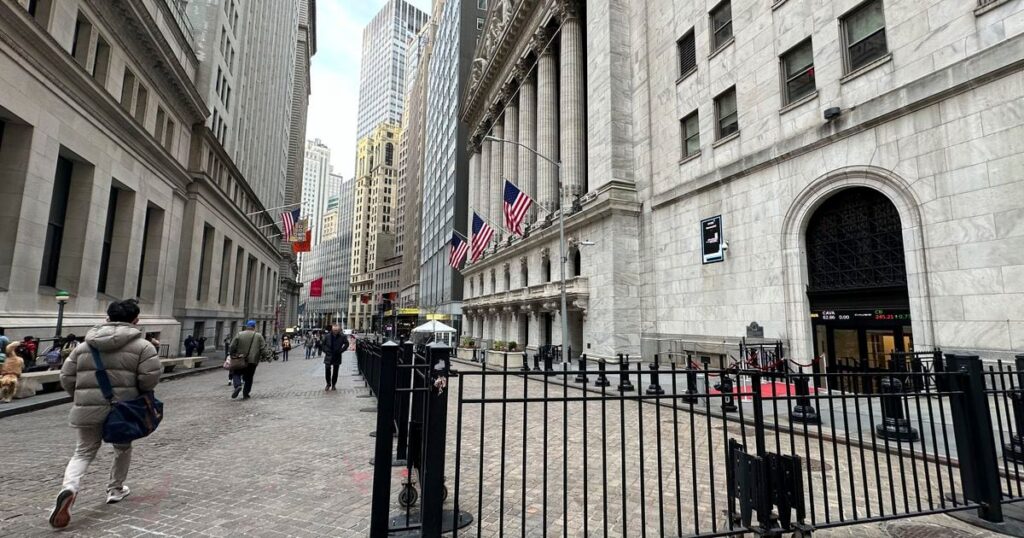NEW YORK (AP) — One of the worst weeks for big tech stocks since the coronavirus crash of 2020 dragged Wall Street to the finish line of its most recent down week on Friday.
The S&P 500 fell 1% in late trading, marking its third straight week of declines. This would be the longest run since September, before falling into a record-breaking frenzy this year.
The Nasdaq Composite was down 2.2% as of 3pm ET. The Dow Jones Industrial Average, which is less heavily focused on tech stocks, was an outlier, rising 134 points, or 0.4%.
The stock market's worst performers included some of the stock market's biggest stars until recently. Supermicrocomputers lost more than a fifth of their value, falling 22.2%. The company, which sells servers and storage systems used in AI and other computing, had soared 226% in the year to date.
Nvidia, another stock that has soared on Wall Street's frenzy over artificial intelligence technology, also lost some of its big recent gains, falling 8.7%. Due to its huge size, it was the heaviest single weight in the S&P 500.
Tech stocks in the S&P 500 fell roughly 7% this week as a somber realization spread across Wall Street that interest rates will remain high for a long time.
Fed officials said this week that they may keep interest rates high for some time. This was a disappointment for traders after the Fed had earlier indicated it could cut interest rates three times this year. High interest rates negatively affect the price of investments, especially those considered the most expensive, forcing investors to wait the longest for significant growth and increasing the risk of recession.
A cut in interest rates had long appeared imminent after inflation cooled sharply last year. But a series of reports this year showing that inflation has remained higher than expected has raised concerns that progress could stall.
Fed officials have insisted they want more confirmation that inflation is falling toward their 2% target before lowering the central bank's key interest rate, which is at its highest level since 2001.
Most traders now expect only one or two rate cuts this year, according to data from CME Group, down from forecasts of more than six rate cuts at the start of the year. An increasing number of people are predicting zero cuts this year.
But Brian Jacobsen, chief economist at Annex Wealth Management, expects inflation to moderate as U.S. households, which have become “sensitive to price hikes” by companies, begin to rein in spending. .
“The huge (flight) of optimism from the market is due to the Fed's lack of foresight and its irrational focus on where inflation has been, rather than what it will be.” Stated.
With interest rates unlikely to be of much help in the short term, companies are under additional pressure to deliver profit growth, another measure of stock prices.
Netflix fell 9% despite reporting better-than-expected profits in its latest quarter. Although analysts called the results mostly solid, the streaming giant disappointed some investors by announcing it would stop providing subscriber count updates every three months starting next year.
Helping to limit market losses was American Express, which rose 5.4%. The company reported that its latest quarterly profit was better than analysts expected. Fifth Third Bancorp similarly beat market expectations, rising 5.5%.
In the oil market, one barrel of Brent crude oil briefly exceeded $90 overnight due to concerns about fighting in the Middle East, before returning to $87.29. Iran's military fired air defenses at key air bases and nuclear facilities in response to drone attacks believed to be carried out by Israel, sparking concerns in the market. But oil prices pared their sharp gains as traders wondered how Iran would respond.
In the bond market, the 10-year Treasury yield fell to 4.61% from 4.64% late Thursday, paring gains this week. Stocks fell further overnight as concerns grew about the possibility of war escalating in the Middle East, but the decline narrowed as the day went on.
Overseas, stocks were also mixed in Europe, after falling more sharply in Asia.
Japan's Nikkei Stock Average fell 2.7%. The country's inflation rate slowed in March, the report said, and investors are looking forward to the Bank of Japan's next move after raising the benchmark interest rate for the first time in 17 years last month.
___
AP writers Matt Ott and Zimo Zhong contributed.


